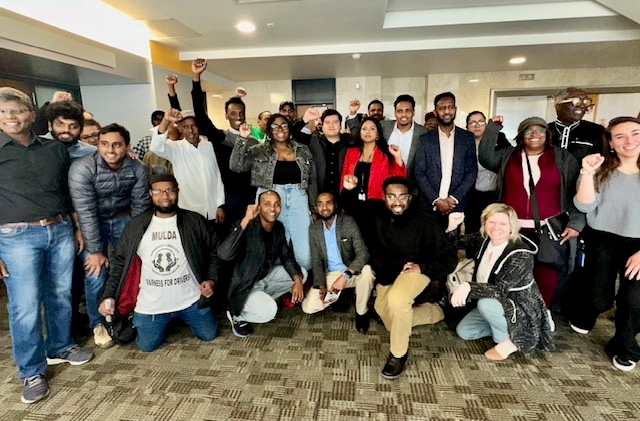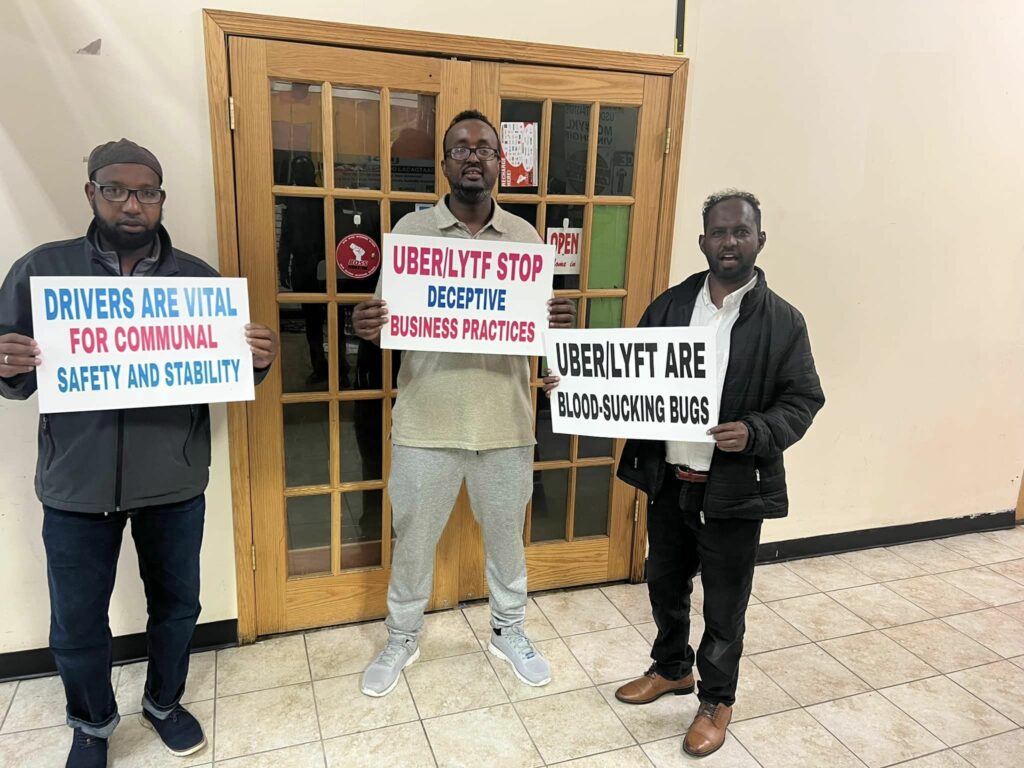
More on the Minneapolis Rideshare Ordinance and Gig Worker Organizing
April 12th, 2024MULDA’s victory echoes last year’s state-level win by the Awood Center (also a Workers Confluence grantee) in their ongoing fight for fair pay and dignity for Amazon warehouse workers. Awood’s membership mirrors the largely East African immigrant workforce within Twin Cities Amazon facilities. Alongside their union allies the Teamsters, the advocacy of Awood’s members was critical to the Minnesota state legislature’s passage of the Warehouse Workers Protection Act. Both Awood and MULDA have pushed past the onslaught of misinformation and fear mongering from these massive corporations and moved elected leaders to declare that these exploitative business models have no place in our communities.
Uber, which recorded profits of over $1.1 billion in 2023, has responded to the driver pay ordinance by threatening to pull out of Minneapolis on July 1st when the ordinance goes into effect. Lyft has threatened to withdraw from the entire Twin Cities metro rather than pay Minneapolis drivers minimum wage. Numerous other companies quickly announced plans to fill the gap, confident that they can meet market demands while also paying drivers a living wage. Most notably, the New York-based Drivers Cooperative is partnering with MULDA on plans to launch in Minneapolis as soon as May 1st. The cooperative model is especially exciting from a worker justice standpoint because, in addition to paying drivers at or above minimum wage, the cooperative’s profits are redistributed to the driver-members rather than paid out to wealthy stockholders.

The gig economy, including rideshare, presents many challenges for worker organizing. The nature of the work means that these workers are isolated from one another, without a shared jobsite. Uber and Lyft have spent millions of dollars on aggressive anti-organizing campaigns aimed at both drivers and customers. And these workers are classified, many would say misclassified, as independent contractors rather than employees, which puts them out of reach of traditional union organizing.
In many parts of the country, including here in Minnesota, unions are advocating for legal changes that would reclassify these workers as employees. As employees they would have the option of unionizing, and they would also be protected by city and state labor standards – minimum wage, earned sick and safe time, and many more – that Minnesotans have fought for and won. There is concern that while changes like the Minneapolis rideshare ordinance will improve driver pay in the short term, these kinds of carve-outs also further entrench a second-tier employment status and jeopardize these workers’ ability to win employee status in the future.
Through their Workers Confluence grant, MULDA has spent the past 6 months in exploratory conversations with the Teamsters Local 120 and SEIU Local 26, two unions eager to identify a path forward that addresses the drivers’ immediate needs while also leaving the door open for gig workers to build greater power in the future. The Minnesota AFL-CIO, the umbrella organization for the state’s unions, has passed a resolution in favor of increasing worker pay and creating a path to unionization for the workers.
The outcome in Minneapolis is still uncertain. The City Council passed the ordinance by a majority too large for Mayor Frey to veto. But Governor Walz has called for a compromise to be found that would keep Uber and Lyft from leaving, and he has also raised the possibility of state legislation to preempt the ordinance. Questions remain about which of the smaller rideshare companies poised to enter the market can scale up to meet rider demand. Regardless of what happens next, the workers of MULDA and their allies have fundamentally altered the balance of power between gig workers and the companies profiting from their labor.
[Photo 1: MULDA members celebrate with city councilors, labor leaders, and other supporters. Photo credit Workers Confluence.
Photo 2: MULDA members tell it like it is at a 2023 action. Photo credit MULDA.]
Share